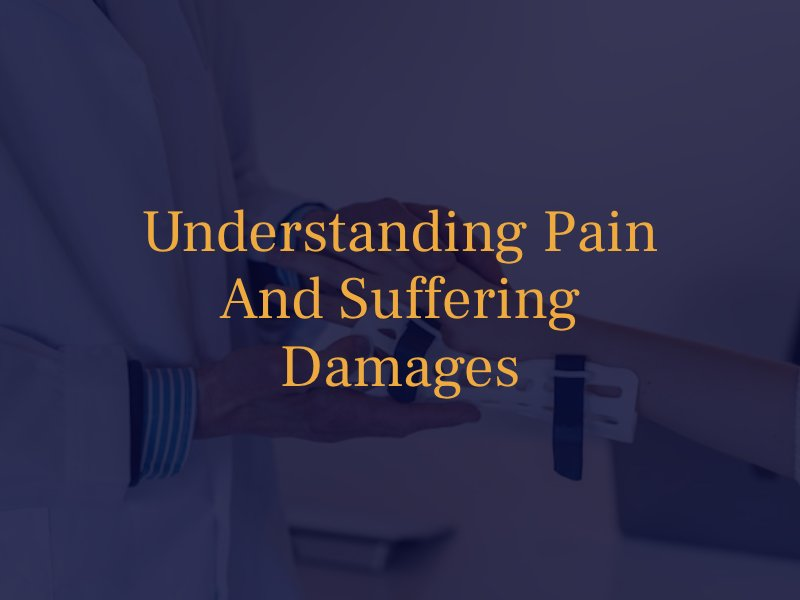
A person injured due to another party’s action or inaction may be awarded compensation for their injuries. There are three general types of damages available in Texas – Economic, Non-Economic, and Punitive/Exemplary damages. Economic damages are the most straightforward because they are easier to quantify and calculate than the other two types. This type of damages includes things like current and future medical expenses, lost wages, and property damage. Punitive damages, sometimes called exemplary damages, are only granted in Texas if the defendant is guilty of gross negligence, malice, or fraud. Additionally, the fraud, malice, or gross negligence must be proven by clear and convincing evidence. The purpose of this award is to punish the wrongdoer and deter similar behavior in the future, rather than to compensate the victim. Non-economic damages are more difficult to quantify and calculate than economic and punitive damages. These damages include physical pain and suffering, mental or emotional pain or anguish, loss of consortium, disfigurement, physical impairment, and more.
It’s not easy to place a monetary value on a person’s experience of these damages. Pain and suffering damages are often more than fifty percent of the total claim. This makes its calculation extremely important. You need the representation of a skillful Dallas personal injury lawyer to help accurately calculate the value of your claim and maximize your compensation.
Types of Pain and Suffering Damages in Dallas Personal Injury Cases
In Texas, injury victims may be awarded compensation for their pain and suffering. The term pain and suffering refers to both the physical and emotional injuries of a victim. Some of the types of pain and suffering you may be able to recover in Texas include:
- Physical Pain. This refers to the distress and discomfort a victim experiences in their body because of their injuries. It can include the immediate pain from the injury, long-term pain experienced during recovery, and even chronic pain that affects a victim’s daily life.
- Emotional Distress. This type of pain is any psychological pain or anguish a victim suffers due to their injuries. It may include depression, anxiety, PTSD, and more. It is important to understand that emotional distress may be as bad or worse than the physical pain caused by the accident,
- Loss of Consortium. Loss of companionship, intimacy, and affection the injury victim can no longer experience with their loved ones is known as loss of consortium. In some cases, family members may have a loss of consortium claim in addition to the victim’s claim.
- Disfigurement and Scarring. When injuries result in lasting disfigurement or physical scarring, it can cause severe emotional distress and anguish that impacts a victim’s daily life. Depending on the situation, victims with scarring or disfigurement may also need to have cosmetic surgeries and therapy.
- Loss of enjoyment of life. When a victim’s pain and suffering prevent them from enjoying their hobbies and activities and have a serious negative impact on their quality of life, it may be compensable in monetary damages.
The determination of pain and suffering and calculating its compensation is subjective. It varies from case to case. You need the representation of an aggressive Dallas personal injury lawyer to present your strongest case so you can receive the full compensation you deserve for all your injuries.
Determining Liability for Pain and Suffering in Dallas Personal Injury Cases
Pain and suffering damages can help ease the burdens of personal injury victims. Of course, to receive any type of damages, another person must be at fault for the incident that caused your injuries. Sometimes there may be multiple parties liable.
The Directly Responsible Defendant
The party that directly caused your injuries by their action or inaction is the most obvious and common type of defendant. For example, another driver runs a red light and crashes into you. That driver would be liable for your damages because their actions directly caused the accident which caused your injuries. Even if you are partially at fault in the accident, you may still be able to receive compensation. Under the Texas modified comparative negligence rule, you are only barred from collecting damages if you are 51% or more at fault.
An Employer
The employer of the directly responsible defendant could also be liable for your pain and suffering in certain situations. This is a theory of law known as vicarious liability. For vicarious liability to apply, the employee must have been acting within the scope of their employment. For example, if a nurse employed by a hospital causes harm to a patient by giving them the wrong medication while on her shift, the hospital, as her employer, could be vicariously liable for the patient’s injuries. Vicarious liability may also apply in other relationships. For example, a parent may be held liable for certain actions their child took that caused injury to another. Likewise, a partnership could be held liable for the actions of a partner and a corporate entity could be held responsible for the actions of its directors and officers.
A Product Manufacturer
When a defective product causes injury to someone, its manufacturer may be held liable for the victim’s pain and suffering. This is known as products liability which applies if a product is defective or dangerous and causes damage to a consumer. For example, if your car has a defective part that causes you to lose control of it, resulting in an accident with injuries, the vehicle manufacturer may be liable for your pain and suffering.
A Property Owner
When someone is injured on another person’s property due to unsafe conditions, the property owner may be liable for their pain and suffering. This is known as premises liability. An example of premises liability would be if you slip and fall in a restaurant because the floor is wet and there is no warning or caution sign. In this situation, it is possible that the property owner could be held liable for your pain and suffering. These are only some of the parties that could be responsible for your injuries. In all of these scenarios, liability depends on many factors. However, as you can see, there could be multiple parties liable for your pain and suffering in a personal injury case. It is important to identify all potentially liable parties who could be held responsible for your pain and suffering. You need a skillful, aggressive Dallas personal injury attorney to fight for your right to receive full compensation for your pain and suffering.
Proving Pain and Suffering Damages
You need to have evidence to support your claim for pain and suffering damages. The more proof you can show, the better your chances are of receiving maximum compensation. Some types of evidence you may use include:
- Photographs or video footage of your injuries and how they have impacted you
- Doctor’s notes and medical evidence such as X-rays, scans, and diagnostic tests
- Therapist of counselor’s notes and testimony
- Other witnesses who can testify about your pain and suffering
- A journal or diary in which you document your pain and the impact the injuries have had on you
Your Dallas personal injury attorney will advise you on the best types of evidence to use for your specific case. Let your attorney focus on gathering evidence and building your strongest case while you focus on healing.
Contact Us Today
If you have pain and suffering caused by another party’s fault, we want to help. Bush & Bush Law Group has the experience and deep understanding of Dallas personal injury cases to get you the justice and full compensation you deserve. Give us a call today at (469) 977-7777 or visit our contact page to schedule a free consultation.












